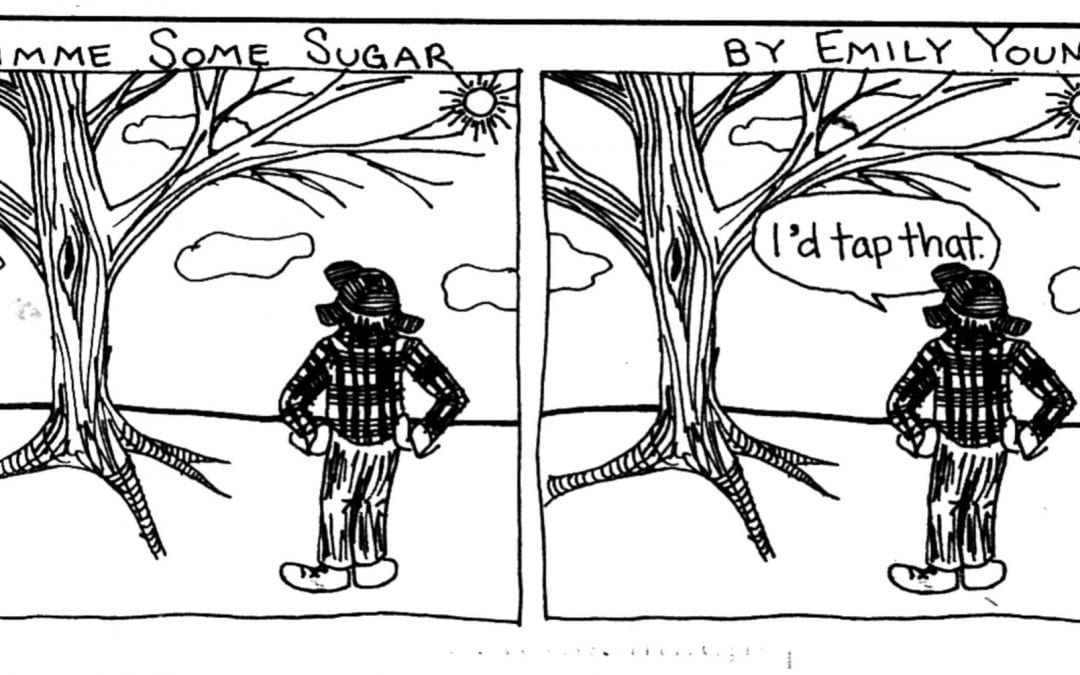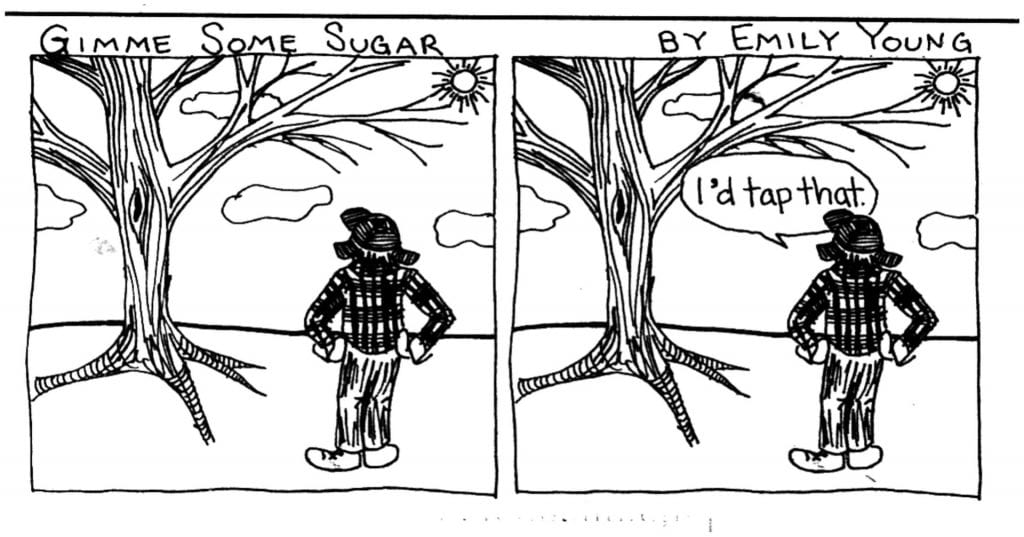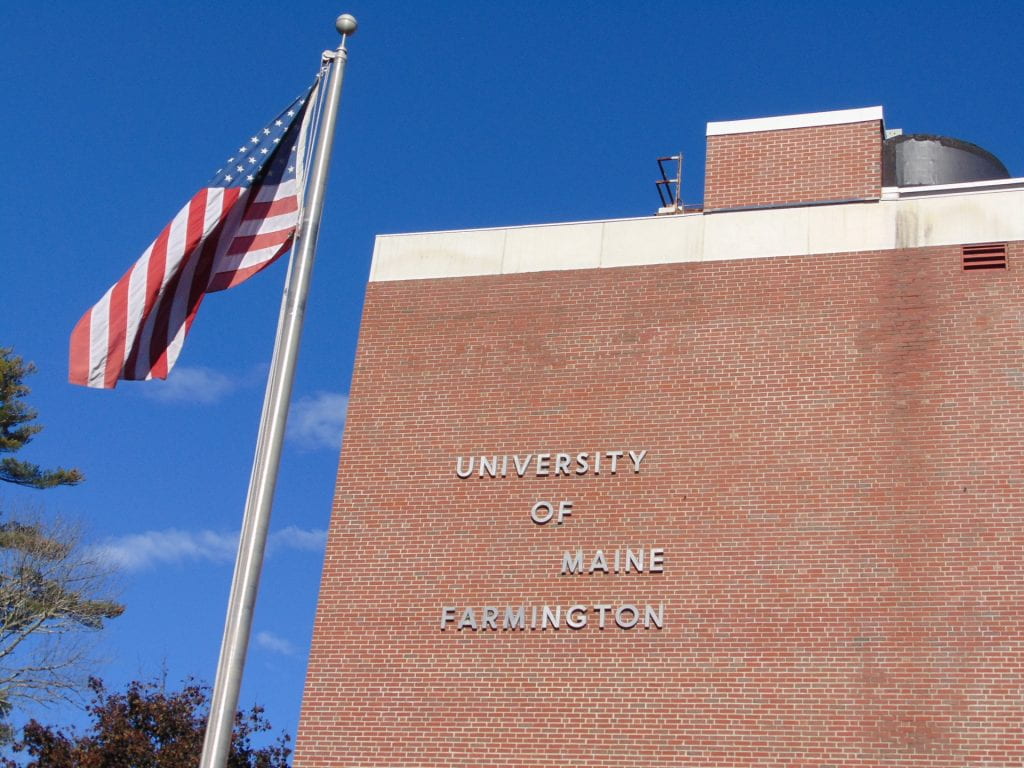
Nov 12, 2020 | Feature, Ye Olde Beaver |
Taking a look back at the past 90 years of our campus newspaper and highlighting noteworthy items that perhaps were best forgotten.

Comic original published The Farmington Flyer in April 2007.
I would too; it looks like a strong and healthy tree. I might even tap it twice, depending on the DBH.
We all love maple syrup, and it’s really too bad that there isn’t the gallon jug of it in the dining hall this year. The corn syrup they have instead just doesn’t do it for us snobby Mainers; we’d rather eat our pancakes dry.
Personally, I’ve started bringing my own bottle of maple syrup with me to the dining hall, but that trend doesn’t seem to have caught on yet.
(Comic originally published in the Farmington Flyer in April 2007)
Nov 12, 2020 | Bite Me Beaver |
Dear Bite,
I find myself having trouble getting into the Halloween spirit. It seems as if everyone on campus is in full Halloween mode, and I’m stuck here. This may account for the fact that I do not have anyone to “trick-or-treat” with (if you know what I’m saying) I just want someone to do fun things with and maybe howl at the moon with every once in a while…
-Lone(ly) Wolf
Dear Wolf,
It sounds to me like you’re having some trouble with the ladies (or men, we don’t judge here). However, you are right, Halloween is coming right around the corner but take this as an opportunity. Wear a costume each day until Halloween, essentially catfishing everyone in real life. No one will know what you look like and maybe then you’ll become UMF’s sexiest man alive.
-Bite
Dear Bite,
We are at this point in the semester where work is piling up and up and I can’t take it anymore. This work is driving me mad. I have one professor who is super strict with deadlines and I’ve already used the “my nana died” excuse. Is there any way that I can ask for an extension without straight out saying “Yo, I suck at time management and spent the last three days on TikTok instead of doing my paper” or am I doomed?
-Procrastination Nation
Dear Procrastination,
We all know we are in a state of emergency, let’s use that to our advantage here. You have to put on your acting pants for this one so brace yourself. Call your professor up and complain of a terrible cough, loss of taste and smell, fever, chills, maybe even start sneezing over the phone. If your professor is up to date on any news they will want you as far away from them as possible until you’re better. Most likely they won’t even open your emails in fear of catching COVID, buying you some time. Let me know how this goes.
-Bite
Dear Bite,
I have a confession I need to get off my chest. I have been writing to you for a little bit now and I think I’ve caught feelings. I may not know who you are, or what you look like but damn, your responses just get me feeling some type of way. Now I know you know who I am through my emails, so if you feel the same way about me, don’t be shy and reach out. I am going out on a limb here and putting my heart on the line so please please please be gentle with your response.
-Hopeless Romantic
Dear Hopeless,
What can I say… To put things plainly, I think your signoff name was very fitting for this piece. “Hopeless”, I have way too many things to do to even think about anything romantic at this point. I will however say that yes I do know who you are (I have received countless emails from you) and to put it simply, I’d just like to keep this relationship professional. Speaking of knowing your identity, no I don’t want to go and howl at the moon with you, sorry.
-Bite
Got a question that needs answering? Let Bite Me Beaver give you some horrible advice! Write into umfdearbeaver@gmail.com.

Nov 12, 2020 | News |
by Colin Harris, Treasurer

UMF is rolling out a new plan with Berkeley Research Group. (Photo courtesy of Sam Shirley)
UMF has partnered with Berkeley Research Group (BRG) to work on a new plan concerning the urban mastrangeloniversity’s goals and how they are going to be attained.
Ryan Mastrangelo, a member of the Strategic Planning Committee and Director of Marketing and Communications at UMF, said in email, “The plan lets people know the school’s purpose, the values (or how staff and students are expected to behave), the context (or what is different about UMF), goals and targets, and how UMF is going to do this (key improvement strategies),”.
Simplified this means that UMF wants to provide the best possible experience to students and this new plan that is being set in place will help in doing so.
“We conducted a national search for a strategic planning firm to work with us,” President Edward Serna said in an email interview. “What impressed us with BRG was their depth of expertise in strategic planning and breadth of experience working in the higher education sector.”
The Strategic Planning Process has been in the making for quite some time now. “We developed our current strategic plan back in 2014. Think about how much the world has changed since then. Honestly, that plan no longer reflects the realities that we are facing. We needed a new plan that more accurately reflects our current and emerging challenges and opportunities,” Serna said.
This new plan is sure to bring questions. Mastrangelo said in an email, “What changes do we want to see in UMF? Should there be an emphasis on certain programs? If so, which ones?” These are the questions that UMF and BRG have teamed up to tackle.
The proposed plan will be three to four pages in length. The proposal will describe the goals of the plan and methods that will be used to accomplish them. Hopefully this will answer any questions that may occur throughout the process.
“I encourage students to get involved in the Strategic Planning Process—if the final result of our work is to identify the best possible path forward for Farmington, your input will help us get a sense of the key issues and themes, as well as hopes and dreams, that will shape a shared vision for Farmington’s future” said President Serna.
Vanessa Charlot, a consultant at BRG said in an email interview, “There’s a place for every voice in the UMF family; whether student, faculty, staff, alumni, or community member.” UMF and BRG place an astronomical value in making sure that the voices of the Farmington community are heard. “Student input is critical to the success of the strategic planning process that is currently underway. The strategic plan will serve as a roadmap for how our university will make decisions for the next five years; and you have a say in that,” said Charlot. “This is an opportunity for you to take ownership of your legacy at UMF and enhance the current and future student experience in a meaningful way,”.
“For me, a successful strategic planning process will result in a plan that the community feels they own. I want us to be excited about the vision and values we identify as representing our aspirations for our community,” said Serna.
In short, the strategic plan is going to drastically change students’ lives here at Farmington and we need YOU to help make Farmington more of a home than it already feels like. To contact BRG about changes you’d like to see in your community please email umf.planning.ideas@maine.edu to submit ideas.
Nov 12, 2020 | Feature |
by Nevaeh Rush, Vice President
A number of students this year at UMF have chosen not to enroll in the Fall semester due to the ramifications of COVID, and rather choosing to take the semester off.
Cylus Hill-Yastek, fourth year and creative writing major, is one of them. “I did not want to contribute to any possible spread with our community being so small,” Hill-Yastek said. “Our campus and our town are so connected.” Hill-Yastek, feeling frustrated with the way things have been handled, made a personal decision not to enroll in this fall semester because he did not want to take in-person classes.
“I would have done online classes, I wanted to,” he said. “My options though were super limited. There were no creative writing classes that I could take available.” The only classes that were offered to Hill-Yastek were typical general education [gen-ed classes] that he had no interest in taking. “After moving online last semester, I felt more prepared to do it again,” he said. “Although the gen-eds I could have done would have been okay, I would have liked to further my degree progress more in creative writing.” Hill-Yastek chose not to fill a semester and pay for general education classes he may not have needed, just because they were his only option.
“I am a devoted academic, I care about school and what I am doing,” he said. “Last year was no expectation, even when the semester went to shambles.” Hill-Yastek, a Dean’s List student, feels saddened to not be in classes this semester. “It is not a choice of not doing school because I don’t want to,” he said. “It is the fact that I even lost my job because I wanted to isolate myself from this pandemic and not be exposed.”
“We should have had a wider range of options and accommodations for students who did not want to be in person, such as myself.” he said. Hill-Yastek, among others, would feel anxious being in class and on campus, which would reflect the quality of their work being put out.
Destiny Clough, second year, Psychology major, feels the same. “There was not enough certainty when it came to my classes.” she said. Many students, even those who chose to attend this semester, feel the same when it comes to the uncertainty of classes and how campus was going to be run.
Cough is a student athlete, participating in track and field. “My sport is a huge motivator for me in school,” she said. “Seeing the struggles of how and if we were going to be able to participate was hard.” Not being able to have the normalcy of a typical sports season was something that pushed Clough to the decision of taking a break from academics this semester.
Clough and Hill-Yastek both felt as though student concerns were not given enough consideration. “Although there were emails,” Clough said. “I feel that there should have been more surveys, for the comforts of the students,” adding “I wish that they had made the transition last semester a little more comfortable,” she said. “That is why myself and others are not coming back this semester, because that transition was so rough.”
Hill-Yastek now faces the tough decision about the spring semester; The future is still unpredictable and there is nothing that the campus can do about that in and of itself. Students such as Hill-Yastek who receive scholarships and grants, face the uncertainty of whether they lose those or not. These financial dilemmas hold great importance in the decision for students choosing whether or not to come back.
Nov 12, 2020 | Feature |
by Maxen Ryder, Distribution Manager
The University of Maine at Farmington welcomes Lewis Robinson as the new fiction writing professor this Autumn. Robinson, a kind and intelligent man, is the writer of “Water Dogs” and a short story collection “Officer Friendly and Other Stories.” He originally came to campus as part of UMF’s Visiting Writers Series. His first visit to UMF inspired Robinson to take an interest in teaching college students. “I was really struck by how passionate the students were at that reading and just how much excitement there was around the creative writing program,” he said. “And how it just seemed as though in the UMaine system this is the place to be if you’re a dedicated creative writing student.”
Two years ago, Professor Pat O’Donnell invited him to teach a section of Introduction to Fiction Writing, it was here when Robinson realized that UMF would be a good place to teach. “I had a great group of students that term and really enjoyed the class,” he said. “I feel like we got a lot of good work done. And so that made me think ‘Oh, this would be a really fun place to teach.” One such former student, Hannah Binder, similarly found Robinson to be a meaningful instructor in that class. “The adaptability of his teaching style is really key, but I also think that lends itself to a freedom that he gives to his students because he respects his students as writers as well as students,” Binder said. “So we were not confined to the ideas or the directions that he previously laid out in the course… if we wanted to run with ideas on our own, he would help us to do that.”
As a new professor at UMF, Robinson finds teaching a powerful opportunity in the world of creative writing. “I’m thinking about fiction writing a lot, you know it’s at the center of my life, and most of that thinking and work that I do is on my own, so teaching is an opportunity to share some of those thoughts that I have around fiction writing and to work with students who are also doing the work on their own but need to have a forum to discuss works in progress…” he said. “Those of us interested in writing love reading, love writing, and so much of that work is solitary, but I do think that there’s a time and a place for people getting together and sharing their thoughts about how fiction works and how writing works.”
Growing up Robinson read and wrote, but in college he became more serious about both pursuits. “I had a mentor who really encouraged me to build a life around writing, or he said this was something you could do,” Robinson said. Post-college, Robinson worked as an assistant for novelist John Irving for two years and helped with letters, relations with the public, and was the first reader for the writer’s first drafts among other tasks. After, Robinson moved to New York and worked in publishing and as a driver moving artwork for galleries and museums. During this time, Robinson worked on his own writing and was published. This allowed him to build a portfolio to apply for an MFA in fiction writing at the University of Iowa. Soon he began teaching fiction writing and published his first book. Robinson worked at University of Southern Maine’s MFA program for eight years, and held several teaching jobs at various schools.
For many years, Robinson has known fellow UMF creative writing professor Jeff Thomson. “I first met Lewis at a writing workshop held by MWPA maybe ten years ago,” Thomson said in an email. “He was the fiction faculty and I was working poetry. We immediately hit it off and have been friends ever since.” Thomson understands the strengths Robinson brings to teaching fiction in Farmington. “I think the most meaningful aspect for him as a teacher—besides his remarkable skill as a writer—is the empathy and care he shows to his students. He knows what it means to struggle to bring character and place to life on the page and is able to nurture students towards that same level of excellence.”
In addition to teaching fiction writing at UMF, Robinson is working on finishing the third major revision of his new novel with plans to then sell it. At the University, he is excited about “building relationships with colleagues and with students.” Farmington is certainly lucky to have him. In regards to his new role in the creative writing department, Robinson is optimistic. “I’ve really enjoyed this job for the first seven weeks, and that’s despite the challenges we’re facing right now with wearing masks and keeping socially distant so I kind of feel like the job will only get better,” Robinson said. “I think it’s just an opportunity to build relationships with people and help people pursue their own artistic goals.”


